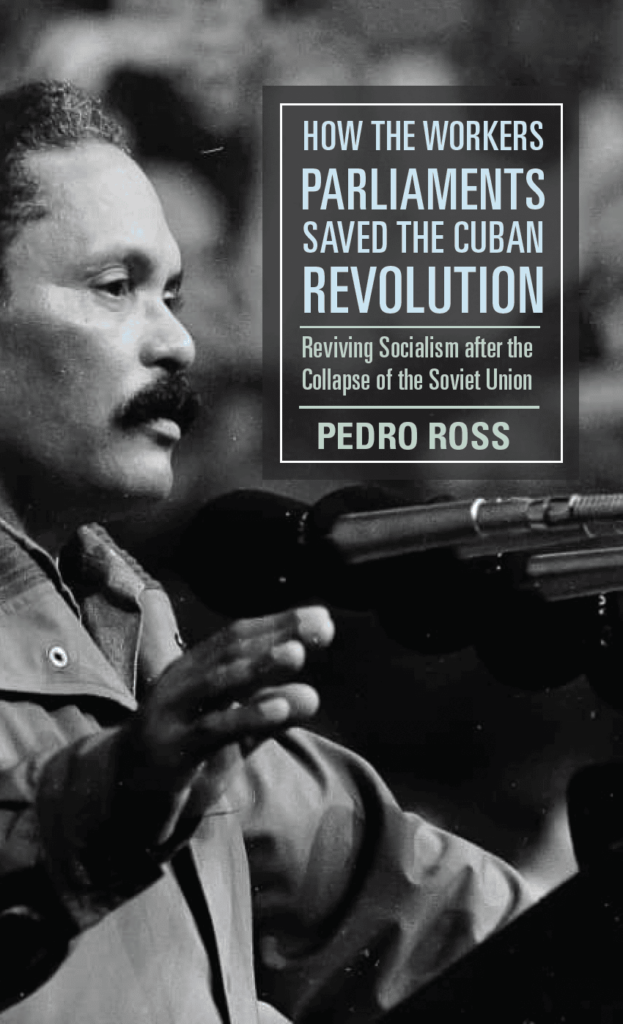How the Workers’ Parliaments Saved the Cuban Revolution
REVIEWS, 16 Jan 2023
Pedro Ross Leal | Monthly Review – TRANSCEND Media Service
Reviving Socialism after the Collapse of the Soviet Union
A Rare Look from Inside Cuba
13 Jan 2023 – How the Workers’ Parliaments Saved the Cuban Revolution brings us to the heart of one of the most precarious and transformational moments in Cuba’s evolution. As the Soviet Union fell to pieces in the 1990s, Cuba managed to evade the fate of its primary trading ally. How was this possible, especially as Cuba endured relentless attacks from the capitalist behemoth directly to its north?
As the GDP plunged by over a third, and the Cuban people endured brutal food shortages— a time of crisis known as the “Special Period”— the country embarked upon a remarkable collective effort to cope with its dire circumstances and escaped the starvation, disease, death, and violence that often plague poor countries facing similar conditions. Not only did Cuba manage to evade collapse, it maintained its high life expectancy, low infant mortality, and universal access to health and education, preserving many of the gains of the revolution.
At the center of this collective effort were lifelong revolutionaries like Pedro Ross, construction worker, literacy educator, and labor activist. As head of Cuba’s labor federation throughout the “Special Period,” Ross developed a nationwide series of “Labor Parliaments” which turned the country into an immense school of economics and politics.
Over a 45-day span in 1993, women’s rights activists, farmers’ organizations, youth movements, and academic associations came together for tens of thousands of meetings, successfully restored the production cycle, and ultimately revolutionized nearly every aspect of life in Cuba. Singularly positioned to write this seminal account of those days, Ross has given us a rare, moving, on-the-ground account of a society mobilized from below, buttressing the Revolution when it was under maximum stress.
What people are saying about How the Workers’ Parliaments Saved the Cuban Revolution
***********************
How the Workers’ Parliaments Saved the Cuban Revolution: Reviving Socialism after the Collapse of the Soviet Union, by Pedro Ross Leal, Publication: 10 Jan 2022, 288 pp.
________________________________________________
Tags: Central America, Communism, Cuba, Democracy, Fidel Castro, History, Latin America Caribbean, Literature, Reviews, Revolution, Socialism, Soviet Union
DISCLAIMER: The statements, views and opinions expressed in pieces republished here are solely those of the authors and do not necessarily represent those of TMS. In accordance with title 17 U.S.C. section 107, this material is distributed without profit to those who have expressed a prior interest in receiving the included information for research and educational purposes. TMS has no affiliation whatsoever with the originator of this article nor is TMS endorsed or sponsored by the originator. “GO TO ORIGINAL” links are provided as a convenience to our readers and allow for verification of authenticity. However, as originating pages are often updated by their originating host sites, the versions posted may not match the versions our readers view when clicking the “GO TO ORIGINAL” links. This site contains copyrighted material the use of which has not always been specifically authorized by the copyright owner. We are making such material available in our efforts to advance understanding of environmental, political, human rights, economic, democracy, scientific, and social justice issues, etc. We believe this constitutes a ‘fair use’ of any such copyrighted material as provided for in section 107 of the US Copyright Law. In accordance with Title 17 U.S.C. Section 107, the material on this site is distributed without profit to those who have expressed a prior interest in receiving the included information for research and educational purposes. For more information go to: http://www.law.cornell.edu/uscode/17/107.shtml. If you wish to use copyrighted material from this site for purposes of your own that go beyond ‘fair use’, you must obtain permission from the copyright owner.
